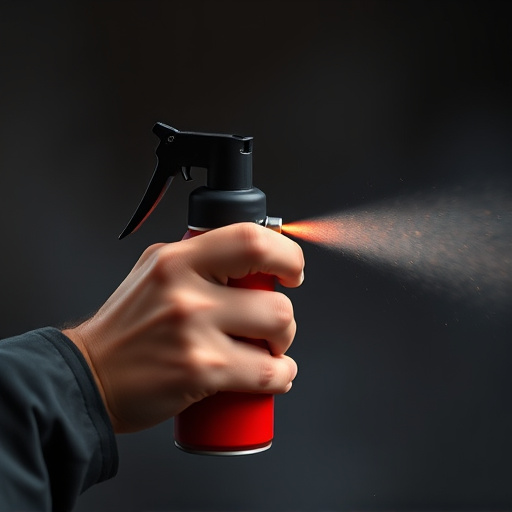To legally carry pepper spray in the US, understand state-specific guidelines on possession, carrying, and usage, including age limits, permit requirements, and regulations on type, amount, storage, and registration. Check local laws, obtain necessary licenses, and choose reputable brands for quality assurance. Safety and responsible practices are paramount, involving training in de-escalation, deployment techniques, and legal boundaries to ensure user and bystander safety.
In today’s world, personal protection is a top priority for civilians across various environments. One effective tool gaining popularity is pepper spray, but navigating its legality and proper usage can be complex. This comprehensive guide explores how to legally carry pepper spray, delving into state-specific guidelines, choosing the right type, understanding carrying options, safety training, and real-world deployment scenarios. By following these practices, individuals can ensure their safety while adhering to legal requirements.
- Understanding Pepper Spray Legality: State by State Guidelines
- Choosing the Right Spray: Factors for Civilian Protection
- Legal Carrying Options: Permits and Regulations Explained
- Safety and Training: Responsible Use Practices
- Real-World Applications: When and How to Deploy Pepper Spray
Understanding Pepper Spray Legality: State by State Guidelines
Pepper spray, a popular self-defense tool, is subject to varying legal regulations across different states in the US. Understanding the legality of carrying pepper spray is crucial for civilians seeking protection. The rules differ from state to state, dictating who can possess and carry these devices, as well as under what circumstances.
To legally carry pepper spray, individuals must familiarize themselves with their state’s specific guidelines. Some states allow anyone over a certain age to own pepper spray for personal protection, while others restrict its use to those with concealed weapon permits. Additionally, there may be restrictions on the type and amount of pepper spray allowed, as well as requirements for proper storage and registration. It is essential to check local laws and obtain any necessary licenses or permits before purchasing and carrying pepper spray to ensure compliance and avoid potential legal consequences.
Choosing the Right Spray: Factors for Civilian Protection
When considering pepper spray for civilian protection, choosing the right one involves several key factors. Firstly, understand your local laws regarding the legal carrying of pepper spray. Each jurisdiction has specific rules and restrictions, so it’s crucial to know what’s permitted in your area to avoid any legal complications. Secondly, consider the type of spray suitable for your needs. Various options are available, from small, easily concealable units to larger ones with stronger concentrations, each designed for different scenarios.
Additionally, look into the spray’s range and effectiveness. A longer reach can provide a safer distance for self-defence, while higher pepper concentration ensures better immobilization. Other features like ease of use, weather resistance, and quick deployment mechanisms are also essential considerations. Always opt for reputable brands that offer quality assurance and regular testing to ensure the spray meets safety standards.
Legal Carrying Options: Permits and Regulations Explained
Knowing how to legally carry pepper spray is essential for civilian protection, especially in situations where self-defense might be necessary. The laws surrounding pepper spray vary significantly from one jurisdiction to another, so understanding local regulations is crucial before purchasing and carrying any type of inflammatory spray.
In many regions, obtaining a permit or license is the first step to legally carry pepper spray. These permits typically require applicants to meet certain criteria, such as completing a training course and passing a background check. Some areas also have specific restrictions on the type, amount, and location of pepper spray that can be carried, so it’s important to research local regulations thoroughly. Additionally, certain professions or individuals at high risk may have different carrying options or exemptions, so consulting with local law enforcement or legal professionals is advisable.
Safety and Training: Responsible Use Practices
When considering civilian protection through the use of inflammatory spray, safety and training are paramount. It’s crucial to understand how to legally carry pepper spray, as well as responsible use practices. Learning proper techniques involves attending certified training programs that teach not just physical application but also de-escalation strategies and legal considerations. Understanding local laws is essential; knowledge of how to legally justify carrying and using pepper spray can protect you from potential charges.
Training should cover safe storage and disposal methods, ensuring the protection of both users and bystanders. Practice sessions should simulate real-life scenarios, enabling individuals to react calmly under stress. Familiarity with the spray’s mechanism, range, and effectiveness is vital for effective deployment. Responsible use means respecting others’ safety, using only when necessary, and adhering to legal boundaries.
Real-World Applications: When and How to Deploy Pepper Spray
In real-world scenarios, pepper spray has proven to be a valuable tool for civilian protection, offering a non-lethal means of self-defense against aggressive individuals or in situations where one feels threatened. Its primary applications include personal safety during evening walks, public demonstrations, and when facing potential assailants. When deployed legally and responsibly, pepper spray can create crucial seconds for an individual to escape or seek help.
To legally carry pepper spray, users must familiarize themselves with local regulations and obtain the necessary permits. Understanding the rules regarding dosage, storage, and use is essential to ensure compliance. Typically, this involves checking state and regional laws, as restrictions vary widely. Users should opt for approved brands that meet specific safety standards, ensuring proper handling and a clear understanding of the spray’s effectiveness range.
Pepper spray can be a valuable tool for civilians seeking personal protection, but navigating its legality and responsible use is essential. Understanding state-by-state guidelines, choosing the right spray for your needs, and ensuring proper training are crucial steps before considering how and when to deploy it. Remember, knowing how to legally carry pepper spray and using it responsibly can make a significant difference in potential self-defense scenarios. Always stay informed about local regulations and prioritize safety when considering civilian protection measures.
